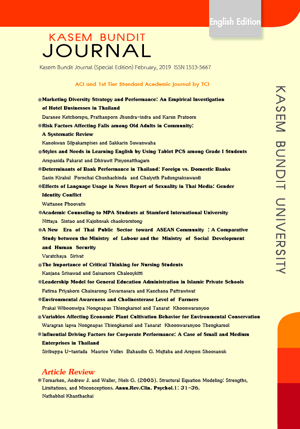Variables Affecting Economic Plant Cultivation Behavior for Environmental Conservation
Keywords:
Model, economic plant cultivation knowledge, environmental education, inspiration of public mind, economic plant cultivation on environmental conservation behaviorAbstract
The purpose of this research was to develop a model of factors affecting economic plant cultivation behavior for environmental conservation in Maha Sarakham Province by using survey research and a questionnaire as tools for data collection. The population was a total of 678 households from Kaeng-Kae Sub-district, Kosumpisai District, Maha Sarakham Province, in 2014. The simple random sampling technique was employed to collect a sample of 400 agriculturists. The Structural Equation Model (SEM) was used for model verification. Results revealed that the structural model of confirmatory factors of Economic Plant Cultivation Knowledge (Kno) and Environmental Education (EE) were able to explain the variation of endogenous factors of Inspiration of Public Mind (IPM) to cause Economic Plant Cultivation on Environmental Conservation Behavior (BEH) with 89.00%. The EE had the most effect on BEH with 0.37, IPM with 0.25, and Kno with 0.16, respectively.
References
Chapin, F.T, Matson, P.A, Mooney, H.A. (2002). Principles of Terrestrial Ecosystem Ecology. New York: Springer.
Gold, M. (2014). “National Agricultural Library”. USDA. Retrieved from: 1 March 2014.
Kenneth, M. Olsen and Michael D. Purugganan. (2002). “Molecular evidence on the origin and evolution of glutinous rice”. Genetics. 162 (2): 941–950.
Leturque, H. & Wiggins, S. (2010). Thailand’s progress in agriculture: Transition and sustained productivity growth. London: Overseas Development Institute.
Mesinthree, S. (2013). World Changes, Thai Adapt. Bangkok: Krungthep Business Media.
Morrasri, P., Thiengkamol, N., & Thiengkamol, T. (2012b). Causal Relationship Model of Little Green Child with Environmental Behavior. European Journal of Social Sciences, 34 (2): 177-189
Mongkonsin, Thiengkamol, N., & Thiengkamol, T. (2013b). Causal Relationship Model of Flood Response
Behavior. Mediterranean Journal of Social Sciences, 4 (1):587-598.
Office of Agriculture and Cooperatives of Maha Sarakham Province. (2014). Area appropriateness for economic cultivation. Retrieved from https://www.moac-info.net/MahaSarakham/index. php?option=com.
Pimdee, P., Thiengkamol, N., & Thiengkamol, T. (2012a). Causal Relationship Model of Electrical Energy Conservation. European Journal of Social Sciences, 32 (3): 306-315.
Pongpit, S. (2009). Reform Thai Society. Bangkok: Powerwisdom Publishing.
Siripanich, S., Sayompurujinant, S, & Muanepueng, P. (2011). Surveillance System of Disease from Occupation and Environment with Passive type. Weekly Report of Epidemiology Division of Epidemiology, Department of Disease Control, Ministry of Public Health.
Supnithadnaporn, A., Inthisang, J., Prasertsak, P., Meerod, W. (2012). Adaptation to Climate Change and Agricultural Sector in Thailand. Retrieved from https://www.adbi.org/files/2011.12.15.cpp.day3.sess3.18.country.presentation.thailand.pdf.
Thiengkamol, N. (2009a). The Great Philosopher: the Scientist only know but Intuitioner is Lord Buddha. Bangkok: Prachya Publication.
Thiengkamol, N. (2009b). The Happiness and the Genius Can be Created before Born. Bangkok: Prachya Publication.
Thiengkamol, N. (2009c). Environment and Development Book 2 (Food Security). Bangkok: Chulalongkorn University Press.
Thiengkamol, N. (2011e). Environment and Development Book 1. (4th ed.). Bangkok: Chulalongkorn University Press.
Thiengkamol, N. (2012a). Development of a Prototype of Environmental Education Volunteer. Journal of the Social Sciences, 7(1): 77-81.
Thiengkamol, N. (2012b). Model of Psychological Factors Affecting to Global Warming Alleviation. International Proceedings of Economic Development and Research, 44, 6-12.
Thiengkamol, N. (2012c). Model of Environmental Education and Psychological Factors Based on Inspiration of Public Consciousness Affecting to Global Warming Alleviation. Mediterranean Journal of Social Sciences, 3(11): 435-444.
Tumpracha, K., Thiengkamol, N., & Thiengkamol, C. (2012b). Causal Relationship Model of Food Security Management. Mediterranean Journal of Social Sciences, 3(11): 639-650.
UNDP. (2012). Thailand’s climate change master plan nears completion. Retrieved from https://www.th.undp.org/content/thailand/en/home/presscenter/articles/2012/08/10/thailand-s-climate-change-master-plan-nears-completion/.
Udonboon, C., Thiengkamol, N., & Thiengkamol, C. (2012b). Causal Relationship Model of Water Conservation Behavior. Mediterranean Journal of Social Sciences, 3(11): 599-611.
UNESCO. (1978). Intergovernmental Conference on Environmental Education Organized by UNESCO in Cooperation with UNEP Tbilisi (USSR) 14-16 October 1977. Final Reports. Paris: UNESCO. U.S.
Waewthaisong, S. Thiengkamol, N., & Thiengkamol, C. (2012a). Causal Relation Model of Environmental Traveling Behavior. European Journal of Social Sciences, 33(2): 184-195.
Downloads
Published
How to Cite
Issue
Section
License
ทัศนคติ ความคิดเห็นใด ๆ ที่ปรากฏในวารสารเกษมบัณฑิตฉบับนี้เป็นของผู้เขียน โดยเฉพาะ มหาวิทยาลัยเกษมบัณฑิตและบรรณาธิการ ไม่จำเป็นต้องมีความเห็นพ้องด้วย







